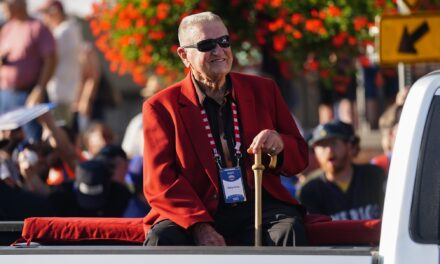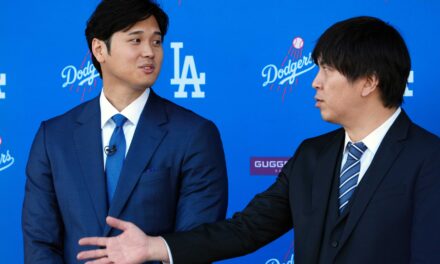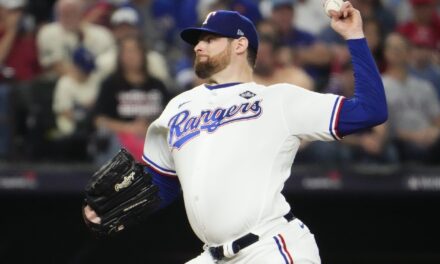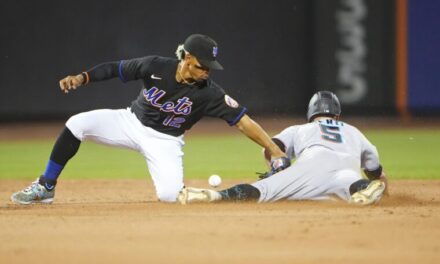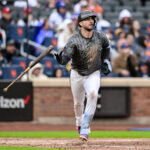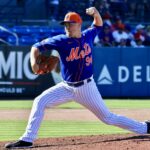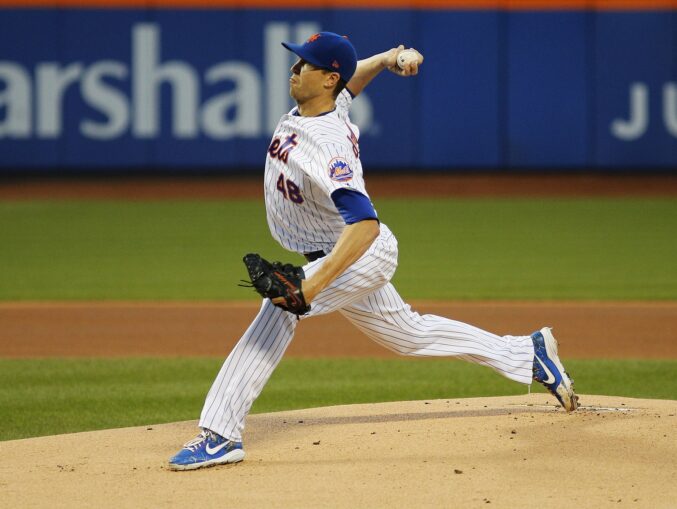
As the regular season draws to a close, it is time to take a close look at the Cy Young Award. While Justin Verlander and Gerrit Cole duke it out in the American League, the National League has many serious suitors for the award.
There are seven qualifying NL starting pitchers with an ERA under 3.00, three with a FIP under 3.00, seven with more than 200 strikeouts, and seven with a WHIP under 1.050 — All Cy Young-caliber numbers. While some pitchers have performed better than others, nobody has singled themselves out as the clear frontrunner. Let’s take a look at each starter, their numbers, and their NL ranks in each stat.
Jacob deGrom: 9-8, 2.70 ERA (4th), 2.84 FIP (2nd), 1.027 WHIP (2nd), 231 K’s (1st), 183 IP (4th), 5.9 bWAR (2nd)
The defending champion, Jacob deGrom continues to strengthen his chances for the award. Coming off a seven inning start in which he allowed one run on three hits while striking out 11, he got back on the right track after back-to-back starts allowing four runs in seven innings that inflated his ERA from 2.56 to 2.76. A few more strong starts from him and it will be tough for anyone to argue he doesn’t deserve his second straight Award.
Max Scherzer: 10-5, 2.56 ERA (2nd), 2.32 FIP (1st), 1.002 WHIP (1st), 219 K’s (3rd), 154.2 IP (26th), 6.0 bWAR (1st)
The fact that Scherzer has the highest bWAR despite having made only 24 starts speaks volumes. If anything is hurting his chances it’s that his competition will make five or six more starts than him, but his 12.6 K/9 and 7.20 K/BB ratios also ranks as best in the National League. His peripherals are outstanding and he’s making a strong case for his fourth Cy Young. At the very least, he is sure to finish in the top-5, as he’s done every year since 2013.
Stephen Strasburg: 16-6, 3.50 ERA (15th), 3.20 FIP (5th), 1.049 WHIP (5th), 222 K’s (2nd), 185 IP (2nd), 5.3 bWAR (4th)
The second of three Washington Nationals on this list, Stephen Strasburg is very quietly putting together a strong case for the Award. His 3.50 ERA isn’t flashy, but his strong 3.20 FIP, 10.8 K/9 ratio, and durability help his cause. In his last four starts he is 1-1 with a 1.67 ERA in 27 innings with 37 strikeouts as he looks to finish strong. Strasburg leads the NL in wins, so at the very least, that San Diego writer that cost deGrom the unanimous Award in 2018 will probably vote for him.
Patrick Corbin: 11-7, 3.16 ERA (8th), 3.38 FIP (7th), 1.141 WHIP (17th), 210 K’s (4th), 179.2 IP (5th), 5.5 bWAR (3rd)
The last of three Nationals on this list, Corbin’s case for Cy Young is quieter than Strasburg’s but possibly stronger. Getting out of hitter-haven Arizona has done him good, and sharing a rotation with Scherzer and Strasburg has probably taken the pressure off as well. He has stayed healthy all season and has great numbers across the board and is finishing strong with a 2.13 ERA in his last six starts.
Sonny Gray: 10-6, 2.75 ERA (5th), 3.37 FIP (6th), 1.100 (9th), 181 K’s (12th), 157.1 IP (T-21st), 5.3 bWAR (5th)
Gray is another quiet but strong suitor for the award. His 6.5 H/9 is the best in the National League, which paired with his strong peripherals, shows his effectiveness this season. He is finishing remarkably strong with an 0.84 ERA across his last seven starts, striking out 51 batters in 41 2/3 innings. Keep an eye on the 29-year-old as more strong starts down the stretch could make him a serious contender for the Award.
Walker Buehler: 12-3, 3.28 ERA (11th), 2.96 FIP (3rd), 1.036 WHIP (4th), 190 K’s (T-9th), 159.1 IP (18th), 4.5 fWAR (5th)
After three Nationals, here come three Dodgers. The fact that Buehler’s strong 3.28 ERA ranks 11th in the NL speaks volumes about the Cy Young race we’re watching unfold. Buehler has outstanding strikeout numbers with 10.7 K/9 and an even more impressive 6.79 K/BB ratio. He allowed six earned runs in his last start which raised his ERA from 3.03 to 3.28 where it currently stands, but a strong finish from the 25-year-old could catapult him into all of the Cy Young discussions.
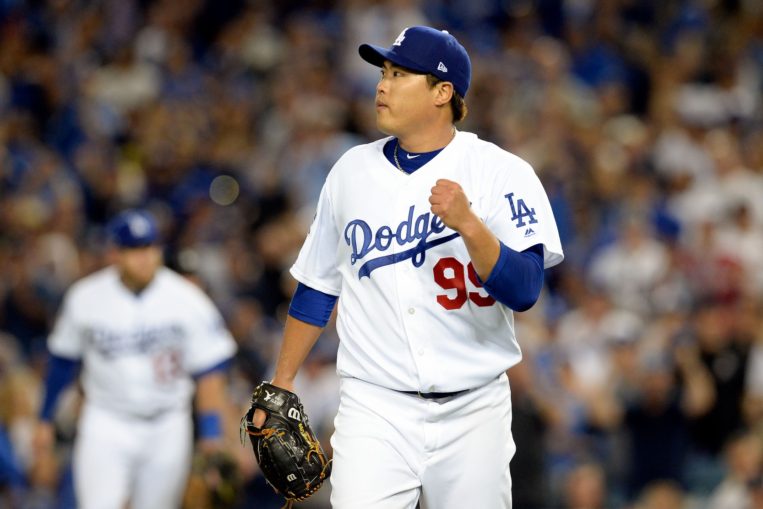
Hyun-Jin Ryu: 12-5, 2.45 ERA (1st), 3.18 FIP (4th), 1.058 WHIP (7th), 142 K’s (T-26th), 161.2 IP (16th), 4.0 bWAR (11th)
On August 16th, the Award was Ryu’s to lose. He was 12-2 with a 1.45 ERA across 22 starts and nobody’s ERA came close. In four starts since then, Ryu is 0-3 with a 9.95 ERA, allowing 21 earned runs in 19 innings. He still leads the world with a 2.45 ERA, but like Scherzer, his lack of innings pitched will hurt him. It also doesn’t help his cause that he’s not a strikeout pitcher with just a 7.9 K/9 ratio. The Dodgers are skipping his next start, so unless he returns to form in his last few starts, it’s getting harder to see him win this award.
Clayton Kershaw: 13-5, 3.06 ERA (7th), 3.74 FIP (15th), 1.050 WHIP (6th), 171 K’s (15th), 159 IP (19th), 3.0 bWAR (17th)
It is strange how many people have forgotten about Clayton Kershaw, the greatest pitcher of our generation. Perhaps it is because he’s in his fourth injury-shortened season, but despite that, he has continued to pitch well. The strikeout numbers aren’t there like they were in 2015 when he struck out 301 batters, but he has pitched well enough to put himself into position for the Award with a strong finish. He is 1-3 with a 5.73 ERA over his last four starts, so he must turn it around to have a chance.
Mike Soroka: 11-4, 2.67 ERA (3rd), 3.50 FIP (10th), 1.109 WHIP (12th), 126 K’s (34th), 158.2 IP (20th), 5.2 bWAR (6th)
The likely NL Rookie of the Year runner-up has had a great season for the surging Atlanta Braves and his catapulted himself into not only the ROY conversation, but the Cy Young debate as well. The strength of his resume depends on what you value, as his ERA, bWAR, and W-L% are outstanding, however his FIP, WHIP, and strikeout numbers leave much to be desired. Only one qualifying starter in the National League has less strikeouts than Soroka, so if you want your Cy Young winner to miss bats, Soroka isn’t your guy. He does lead the NL with a 0.7 HR/9 ratio, all the more impressive considering the times.
Luis Castillo: 14-6, 3.21 ERA (10th), 3.63 FIP (12th), 1.129 WHIP (15th), 208 K’s (5th), 173.2 IP (8th), 4.6 bWAR (8th)
The second of two Cincinnati Reds on this list, Castillo’s ERA sat at 2.63 on August 10, but after recording a 5.40 ERA in his last six starts, his chances of winning the award are becoming slim. The strikeouts and innings-pitched are there, so if he can bring his peripherals down with a few strong starts down the stretch, he can re-insert him into the discussion. Right now, though, he doesn’t stand much of a chance.
Jack Flaherty: 10-7, 2.99 ERA (6th), 3.66 FIP (13th), 1.028 WHIP (3rd), 196 K’s (8th), 168.1 IP (10th), 4.4 bWAR (9th)
Last and certainly not least, Jack Flaherty has rocketed himself into serious contention for the Award thanks to a remarkable run. On July 6th, Flaherty had a 4.90 ERA. Since then, in 12 starts, Flaherty has allowed only seven earned runs in 78 1/3 innings-pitched (0.80 ERA) with 95 strikeouts. Opposing hitters are slashing .146/.212/.228 against him during that span as his numbers continue to improve at an amazing rate.


